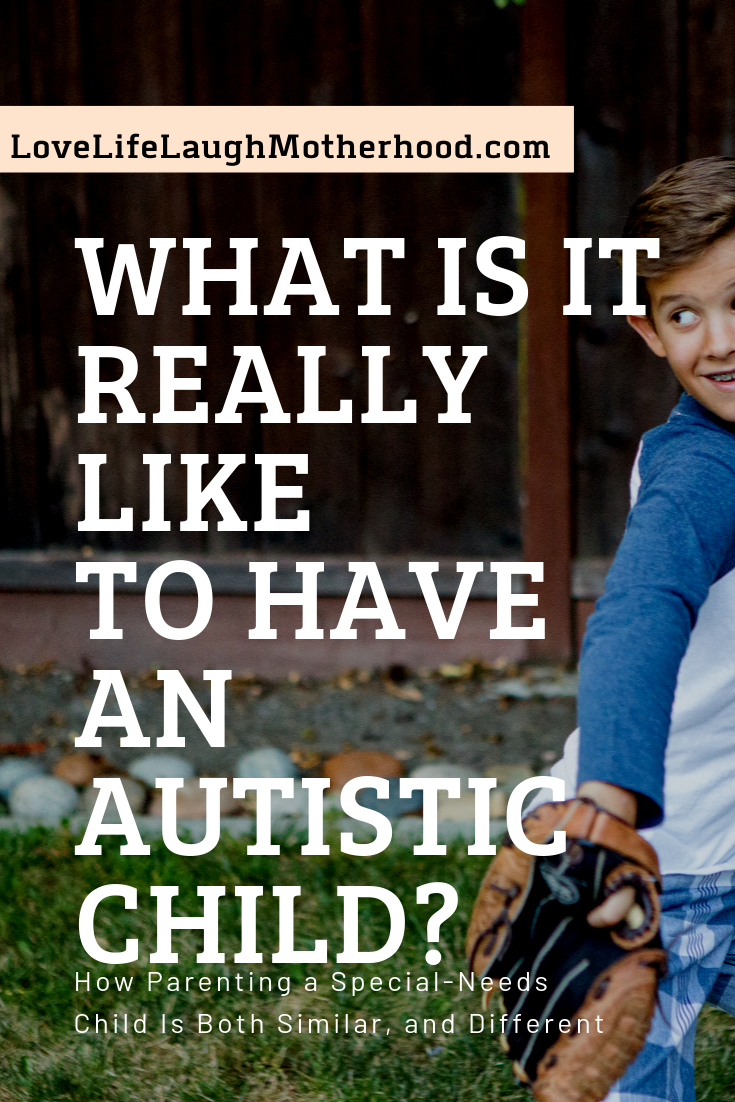
What Is It Really Like To Have An Autistic Child?
This is not a black-and-white answer.
Every child is unique and different. This rule applies to both neurotypical children, as well as those on the spectrum.
Maybe you know someone with a child on the Autism spectrum. Or, you are in the stages of having your own child diagnosed.
Here are a few things you should know.
Parenting is hard…no matter what.
Anyone who said being a Mom or Dad was easy – is pulling your leg.
Each individual struggle and triumph can be as unique as the child themselves. But parenting is never an easy task.
Even neurotypical (children without sensory or neurological conditions) have traits that compare to those found common with children who have Autism Spectrum Disorder.
All kids go through stages of picky eating, sleepless nights, and daily tantrums.
It’s unfair to say parents of average, neurotypical children have it easier than those of autistic children. Both share their own equal parts of frustrating moments.
What’s the difference when you have an autistic child?
While most kids can be picky eaters, a child with autism may have more of an aversion to textures, rather than just the “look” of a green vegetable. Some textures can range from being unpleasant, to rather painful.
As some kids can’t stand hard, crunchy textures, others like my son absolutely love them! He never used to have any kind of “picky eater” tendencies, but now opts for crunchy, raw veggies over steamed or cooked.
These difficulties can make meal prep a more difficult task for parents, who want to make sure their child is getting enough nutrition through the foods they can eat.
But it’s not just food aversions that make parenting different….
Autistic children can have many sensory needs and aversions
While often a neurotypical child may say they don’t “like” the Christmas sweater you picked out from them, and refuse to wear it.
This is very different than the autistic child’s refusal of certain fabrics and textures. Their heightened sensitivity to touch and sensation can make your run of the mill wool sweater an extremely uncomfortable thing to wear.
Most neurotypical kids are very good at naturally filtering out minor lights and sounds that, to be frank, just aren’t that important to them. Say, for instance, the flickering of a light bulb, or the sound of bubbles from a small fish aquarium.
But because kids with Autism or Aspergers have such a heightened sensitivity to these things, they notice these types of things a lot more than the average person. The sounds of keyboard typing might be hurtful to their ears, even while comparatively soft-sounding to the rest of us.
Tips on Helping An Autistic Child Transition Into Kindergarten
Communication can be another big difference in having a neurotypical child versus having an autistic child
Another symptom of ASD can range from a delay in language to a lack of communication resulting in a nonverbal condition.
While some children remain speechless, most do develop communication. But this can still be difficult for them, and their parents.
I can tell you from experience, having a 4-year-old who has very little words he chooses to use, this can be extremely frustrating for both of us. Other kids can tell their Mom what they want to eat or do, and what happened at school.
But mine can’t. It’s not that he entirely doesn’t want to (there have been moments he has said a full sentence, no problem. Such as “I’ll do what I want,” as we fight over bedtime). But I believe he often can’t internalize exactly what is he feeling, and translate those feelings into spoken words. When you think about it, many adults have this problem, even without being Autistic.
Read This Mom’s Response to “Do Vaccine’s Cause Autism?”
So, what is it really like being an Autism Mom?
I imagine it’s pretty similar to being a Neurotypical Mom, but varies just a tad.
Your child verbally whines that it’s a school night and they want to watch one more episode of Paw Patrol before bed. Mine cries that we put the toys away, and he has to line up his cars across the coffee table one more time before he will lie down (Lining up toys could be a possible sign of autism).
Most boys love Monster trucks and shriek in delight at the loud engines. Mine becomes anxious, shrieking at the loud noise and opts for quieter environments.
Your daughter doesn’t want to eat her broccoli because “it’s yucky.” My son will only eat his raw, and giggles at the crunching noises.
At the end of the day, your child may say “I love you.” My child hugs my neck, whispers “bee-boo” and we snuggle to sleep.
Every child is unique and different. if you really want to know what it’s like to have an autistic child? Talk to a fellow parent about what makes their child different and special.
It just might give you some insight into the differences, and similarities, to parenting your own.


You said it earlier in the post: parenting is hard, no matter what. As we were trying to pin down a diagnosis for one of our girls last spring, I remember all the long talks I had with one of the other members of the girls’ GS troop’s leadership team. Her children are on the opposite end of the spectrum from what used to be called Asperger’s, and Scouting is very much a socialization exercise for them. And the other Girl Scouts think nothing of her daughter Kay (not sure what it’s like for her son in Boy Scouts) -they know she’s “different” but couldn’t care less, far as I can tell. But watching the other troop leaders – several of whom I also know have kiddos with learning differences! – is hard. They certainly know what’s going on with Kay, and they have their own LD-child parenting “war stories,” but they still get frustrated that Kelly has to spend SO MUCH time just parenting her kiddos that she doesn’t always “pull her weight” in troop leadership responsibilities. We are currently NOT in one of the more intense phases of my daughter’s diagnosis/”new normal” daily-life process, and have now settled into the current routine of all the meetings and therapist/doctor’s visits; but it makes me sad that other mamas who’ve been there have a hard time with the fact that for Kelly’s family, they are ALWAYS in one of these more “intense” parenting phases because that’s just where their kiddos and family are at. Often when I get to meetings where Kelly is one of the leaders on duty, I just have to go up to her and give her a hug and she all but falls apart. So yeah, parents everywhere – be kind to each other, always, and no you DON’T always know what’s going on in someone else’s house or what life is like in their shoes. And a little empathy and non-judging goes a loooong way
This is so insightful and great for all mamas to read.
Thank you so much for sharing this~ I think too often as parents we feel like everything is black and white… I love you so you say I love you back, but so often they express it in different ways! You are such a great mom to see how to love your child in a way he loves to be loved!
Thank you for educating me on this because I have so many friends with autistic children and it helps me understand so much better.
Thank you for sharing your sensible, warm and kind writing. Every child and every family is different and you have written about your own challenges so thoughtfully.
Thank you for sharing this.This post is so helpful.It’s very insightful to see an honest perspective from you.
I love this list so much comparing a neurotypical child to an autistic child. It’s the same but also different for sure. It’s a different kind of hard I’m sure. Although not autistic, I have two (maybe three – the youngest is only two) neurodiverse kiddos and I would say the difference for us is the INTENSITY! But the love is all the same or at least I hope so ❤️
I appreciate your openness on this topic, I’m a special education teacher and work with many students with autism. Your voice as a parent is so valued and important.
I wish this was talked about more, and that more people were given a chance to understand autism! Parenting is definitely hard, no matter what, but being surrounded by others who don’t understand must make it harder!
So important. I love the way that you have written the post . Really very well done. So important to educate everyone about the subtlety.
I have friends with autistic children. I feel for you all. I see how tough it is.
Coming from a P/T Conference for my Pre-K daughter this week this post has opened up my eyes a bit as to what might be going on with my own daughter at school. She’s also 4 years old, but she is having difficulty at school and while the teacher assured me that diagnosing is too early for her based on our personal background – I don’t feel as if she is autistic based on this post, and speaking with my sister who’s son is on the autism spectrum. I think that if my daughter has some type of mental disorder or anything of that nature, it may perhaps be ADD or something along those lines. But you are right, no matter if your child has a disability, disease or if your child is just perfectly healthy – parenting any child is hard. We each go through our own struggles, and we just need to be there for one another. Be their shoulder to cry on, or just be there to listen to their struggles and help if we can.
I love this! What a great way to spread a little awareness about autism. Some people may not know about the different aversions and can be insensitive. Parenting is definitely hard, no matter what!
-Jennifer
It is nice to learn more about autism.I don’t have a lot of interaction with kids who are autistic and I always like to educate myself.Thanks for sharing your experience.
Thank you for shedding some light on autism. I didn’t know that they can have heightened Sensitivity to things. This is very informative